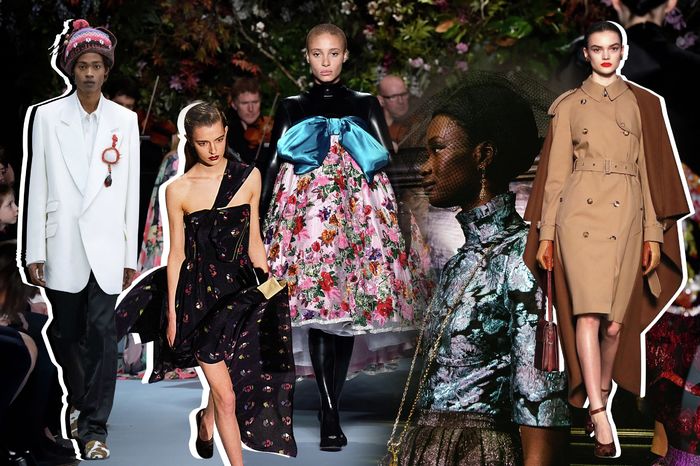Does liking fashion make you vain?
Clementine Lussiana investigates why outside critics look down on the fashion industry, arguing instead that having an appreciation for the superficial does not make a person superficial

Vacuous Vogue editors. A phrase uttered by a speaker at the Cambridge Union a few weeks ago, a term used flippantly, a side comment to his point. One that stuck with me after the debate had finished, and everyone had ebbed out into the dark and cold. A phrase I could not quite figure out.
Because isn’t it exciting, and challenging, and glamorous to be a fashion editor? Would it not take ingenuity and talent? Isn’t it cool?
I realised, mid-gruelling-cycle back, that other than the alliterative effect of the statement (which, admittedly, had a nice ring to it), the reason he had labelled Vogue editors vacuous rather than vivacious or visionary is simple. Fashion is superficial in nature. It’s all about how you look, addressing only the surface-level appearance. One can easily assume that those deeply interested in it would be considered superficial too.
Except, the thing is, it doesn’t make sense at all. Fashion is art, after all, so why is the ‘fashionista’ often associated with shallowness and vanity, where the avid art historian is erudite? Clothing is no more surface-level than a painting. What makes Botticelli deeper than Balmain?
“What makes Botticelli deeper than Balmain?”
Yet the relationship between superficiality and fashion shares a rich history. Look no further than the 'it' girl trope throughout pop culture: the girl who has it all, the girl everyone wants to be or be with. The girl who swaps books for boys, passion for parties. The girl, most importantly, who knows how to dress, who is fashionable, a trendsetter. The bitch.
This is a common theme. The stereotypically attractive, fashionable girl is the story’s villain, often associated with a superficial personality. Meanwhile, the heroine, the genuine girl who gets the grades and not much else, is badly dressed. But she couldn’t care less what she wears. Why would she? She’s deeper than that, after all. She’s got substance.
Take the 2000s classic Mean girls. Cady Heron is kind and authentic back when she’s the innocent newcomer who doesn’t quite know how to fit in and doesn’t quite know what to wear. She’s taken in by the Plastics, becomes ‘hot’, becomes ‘stylish’, and consequently becomes the new villain. She’s soon as superficial as the rest of the clique, and this is reflected in the sudden care she places in her appearance, and the subsequent dramatic shift in her style. Her rediscovery of her old, authentic self is made apparent when she arrives at prom wearing a mathletes t-shirt. She is once again kind and authentic, and the implication is it is because she has turned her back on the trivial. The trivial being, of course, an interest in her own appearance.
The same applies to another cult favourite, The Devil wears Prada. Andy Sach’s distancing from her boyfriends and friends directly correlates with her growing interest and success in the fashion world. She undergoes a style transformation, swaps bulky loafers for Chanel boots, and simultaneously begins to be perceived by her loved ones as selfish and self-absorbed. Again, it is only once Andy makes the decision to turn her back on this world that she regains her authenticity: her boyfriend takes her back, and she gets a new, serious job, one where she can be a journalist with integrity.
The suggestion is that in dressing in a way perceived as ‘better’, the individual becomes a worse person. A dramatic interest in fashion is made synonymous with a lessened interest in everything else. The implication is obvious: the girl who decides to care deeply about her appearance is superficial. Shallow. Misdirected. And the thing is, female characters are very rarely portrayed to be well-dressed, and intelligent, and genuine. Despite the female ability to be multi-faceted (radical, I know), it appears that women on the silver screen very rarely have it all.
But these are dated examples. Pop culture of the early 2000’s should not be reflective of a contemporary mindset, nor should it indicate why that speaker decided to label Vogue editors vacuous now, twenty years on from the portrayal of these unfairly depicted over-saturated cinematic heroines.
“Having an appreciation for the superficial does not make a person superficial”
The issue is, these things have filtered out into other realms of life. After all, what is the pick me phenomenon if not women judging other women for possessing traditionally female attributes, such as the desire to ‘dress up’, devote time to their appearance, and love clothes unapologetically? The trope is destructive, a result of internalised misogyny and the tendency to distance women from stereotypically feminine archetypes. The indication is that an interest in the superficial and a deeper individual value cannot go hand in hand. After all, being ‘cool’ stands on the opposite end of the spectrum to effort. The cool girl (re: the Gone Girl Monologue) is effortlessly dressed. She has not spent hours on her outfit. She throws something together, something that works. Because, yet again, an active interest in the superficial is perceived as a negative attribute. It rids the individual of deeper substance. The cool girl looks cool without trying because, well, the ones who try aren’t cool. The ones who take fashion seriously are commonly associated with undesirable qualities.
Therefore, I would like to make a proposition: having an appreciation for the superficial does not make a person superficial. This false association has been drummed into us and has provoked some to believe that the fashion world and an interest in it are ditsy, glitzy, trivial. But clothes are art, and there is no reason why the fashion lovers of the world should not be considered a part of the elusive realm of the cognoscenti. The joke is on the people who believe themselves to be above the frivolity of fashion, and as a result, end up making an inevitable style statement. We cannot unsubscribe ourselves from the world of fashion. Best to make the most of it.
That said, things are changing. A surge in the baddies and girl bosses (but not gaslighters or gatekeepers) of social media are leading to a glorification of the well-dressed woman. Respect for clothes and the way they are worn is long overdue. An acknowledgment of the fact that the way women decide to express themselves through fashion has no bearing on their intellect. I hope that things continue to change, and that this speaker at the Union (among others) comes to realise that an interest in the superficial and the authenticity of the individual are not mutually exclusive.
 Comment / Plastic pubs: the problem with Cambridge alehouses 5 January 2026
Comment / Plastic pubs: the problem with Cambridge alehouses 5 January 2026 News / Cambridge academics stand out in King’s 2026 Honours List2 January 2026
News / Cambridge academics stand out in King’s 2026 Honours List2 January 2026 News / Cambridge businesses concerned infrastructure delays will hurt growth5 January 2026
News / Cambridge businesses concerned infrastructure delays will hurt growth5 January 2026 News / AstraZeneca sues for £32 million over faulty construction at Cambridge Campus31 December 2025
News / AstraZeneca sues for £32 million over faulty construction at Cambridge Campus31 December 2025 Interviews / You don’t need to peak at Cambridge, says Robin Harding31 December 2025
Interviews / You don’t need to peak at Cambridge, says Robin Harding31 December 2025










